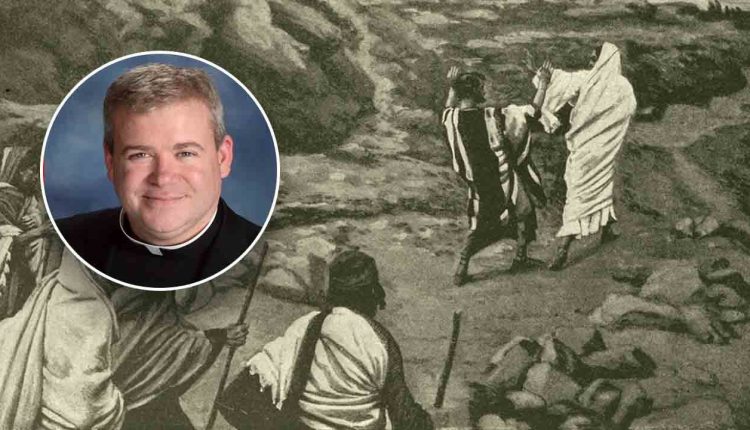‘Challenge and joy of living for God and others’ is highlighted this weekend, says South Carolina priest
“Then Peter took Jesus aside and began to rebuke him, ‘God forbid, Lord! No such thing shall ever happen to you.’ He turned and said to Peter, ‘Get behind me, Satan! You are an obstacle to me. You are thinking not as God does, but as human beings do'” (Matthew 16:22-23).
This verse comes from the Gospel of Matthew, one of the three synoptic Gospels in the New Testament of the Bible.
Not much is known about St. Matthew, who is credited with writing the Gospel of Matthew, says Christian website Overviewbible.com.
When Matthew was called by Jesus to be one of his disciples, he was employed as a publican or tax collector — a “reviled profession” at the time.
CALIFORNIA PASTOR ADVISES ALL TO PUT OUR HOPE IN GOD IN TOUGH TIMES: ‘DON’T GIVE UP’
And though he’s one of the authors of the Gospels, he does not appear much in the Bible: St. Matthew is only mentioned seven times, said the same website.
“In a world that relishes selfishness and rewards self-centeredness, the Gospel message is a needed and greatly welcomed breath of fresh air,” Fr. Jeffrey Kirby told Fox News Digital.
Kirby is pastor of Our Lady of Grace Parish in Indian Land, South Carolina, and host of the daily devotional, “The Morning Offering with Father Kirby.”
In this verse, Jesus “calls us out of our self-created small worlds and offers us the challenge and joy of living for God and other people,” he explained.
This message is particularly poignant for Labor Day, observed on Monday, Sept. 4, 2023, said Kirby.
ST. PAUL REVEALED THE JOY OF LIVING FULLY FOR GOD – SOMETHING ALL CAN LEARN, SAYS TEXAS PASTOR
“The lesson of love that is drawn from the cross is the lesson lived by the American worker, whom we honor this Labor Day weekend,” he said. “The person who works places others before themselves.”
Workers, said Kirby, “labor to provide and care for their families.”
“The American worker offers sacrificial love and today merits our gratitude and esteem.”
“The American worker offers sacrificial love and today merits our gratitude and esteem,” he said.
“We honor American workers because we honor the love they give to others and the service they provide to society.”
During His earthly ministry, Jesus “lived a life of sacrificial love and compassionate service to others,” said Fr. Kirby, following the will of God the Father.
‘COURAGE’ IS AN INVITATION TO TRUST THE LORD FULLY, SAYS WASHINGTON, DC-BASED FRIAR
In following God’s will, Jesus “found freedom and direction in its twist and turns,” he said.
“No one likes to see their loved ones suffer, but nothing great is truly accomplished without suffering,” said Kirby.
“So when Jesus told His disciples that He would have to suffer in order to accomplish God’s will,” said Fr. Kirby, “St. Peter did what any friend would do: He rebuked him, saying, ‘God forbid, Lord! No such thing will ever happen to you!’”
Workers “labor to provide and care for their families.”
What Peter did not understand at the time is that “suffering is a path of love,” said Kirby. “Suffering is the path of happiness in a fallen world. Suffering is the way to eternal life.”
Speaking to St. Peter, Jesus said that he was an “obstacle.”
What Jesus meant by this, explained Kirby, was: “If you love me, then you will support me in this saving work. If you love me, you will walk with me. Do not change my path or redirect my steps.”
Jesus was telling Peter to “be a true friend” and to “walk where I must walk.”
“Love,” said Kirby, “is about accompaniment. Love is about support and companionship. Love is one of the ways we honor and stand in awe at the sacrifice offered by our loved ones.”
“As the Lord Jesus lived the way of love, so he calls each of us,” explained Kirby — also noting that Jesus told humanity that those who wished to follow him needed to “take up his cross and follow me.”
Said Kirby, “The cross, therefore, is the standard of love. It is the crucible and refining fire of true love.”
He added, “The weight of the cross is the summons for us to die to ourselves so that we might more fully love God and those around us.”
Read the full article here

